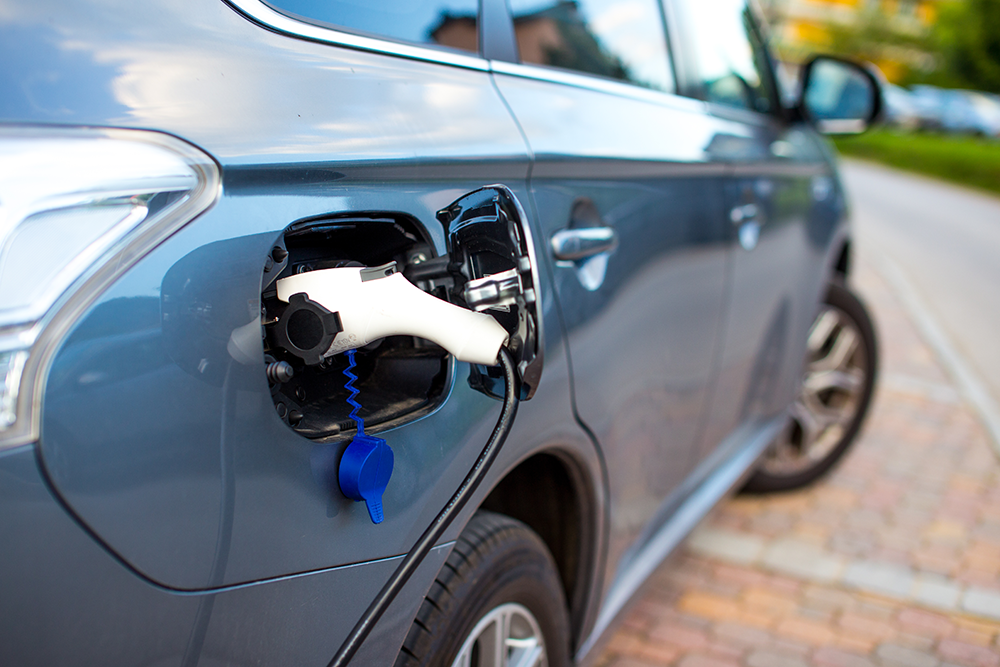New White Paper: Electric Vehicles Have Potential to Transform the Grid with Previously Unrealized Benefits in the Midcontinent
June 5, 2018 | Brendan Jordan | Education

The continuing surge in electric vehicle (EV) use has utilities looking to future impacts on the existing grid structure. Now, a unique consortium of stakeholders has released a white paper that shows that grid transformation can not only meet EV demand, but it can simultaneously benefit utility customers, the economy, and the environment.
The white paper is the work of the Midcontinent Transportation Electrification Collaborative (M-TEC). Co-convened by Great Plains Institute and ChargeUp Midwest, the group is composed of representatives from automakers, state government, electric utilities and cooperatives, charging companies, and environmental organizations. The group aims to inform decision-makers’ thinking around policies and initiatives to speed the electrification of transportation in the region.
“We know that EVs have numerous benefits related to reductions in greenhouse gas emissions and reliance on fossil fuels, as well as cost savings for drivers and fleet managers. However, the untapped potential we need to pursue is how EVs can benefit the electric grid and electric customers,” said Brendan Jordan of Great Plains Institute. ”Fortunately, the new M-TEC white paper shows that there is an emerging consensus about why utility EV programs are needed and how they should be designed.”
The white paper, entitled “Electric Utility Roles in the Electric Vehicle (EV) Market: Consensus Principles for Utility EV Program Design,” is M-TEC’s inaugural contribution in their work to find solutions and inform decision-making. The paper’s guiding principles are that utility EV programs should strive to:
- Benefit customers
- Decarbonize the electric grid and transportation sector
- Benefit energy security, reliability, and the economy
- Help to overcome barriers to adoption of EVs
- Seek to offer cost-effective environmental and public health benefits from EVs
- Contribute to a competitive marketplace while maintaining a good consumer experience
- Contribute to the progression of advanced mobility
“The fact that this diverse cross-section of stakeholders agreed on the guiding principles of this white paper is a testament to the potential success of our collaboration going forward,” said Charles Griffith of ChargeUp Midwest. “We are proud to be part of this effort and look forward to sharing our work with others as we continue to generate ideas and recommendations for how utilities should engage in the growing EV market.”
Unlike similar efforts in other regions of the U.S., which can rely heavily on regulatory control and taxpayer subsidies, M-TEC takes a more holistic view of future challenges and the stakeholders who can create novel and innovative solutions. Building on this white paper, M-TEC will continue to foster effective regional collaboration to expand EV charging infrastructure and increase EV adoption.
“Xcel Energy is pleased to be part of the M-TEC process as we work with members to find common ground for utility EV programs,” said Aakash Chandarana, regional vice president of rates and regulatory affairs. “Electrification of transportation and other uses can have significant benefits to all customers, while improving air quality, decreasing carbon emissions and keeping energy bills low. We are working with stakeholders to design new EV programs with these M-TEC principles in mind.”
About ChargeUp Midwest: ChargeUp Midwest is a partnership of environmental and a clean energy organizations actively working to increase electric vehicle deployment throughout the region in Illinois, Missouri, Michigan, Minnesota, and Ohio. Through ChargeUp Midwest, organizations seek to engage with a broad range of stakeholders to support actions that increase investment in electric vehicle infrastructure, create a more resilient and low-carbon grid, expand education of the public and policymakers about the benefits of electric vehicles, and otherwise accelerate the production, sales and access to electric vehicles in the region for all Midwest residents.
About Great Plains Institute (GPI): As a nonpartisan, nonprofit organization, Great Plains Institute (GPI) works with diverse interests to transform the energy system to benefit the economy and environment. We combine our unique consensus-building approach, expert knowledge, research and analysis, and local action to work on solutions that strengthen communities and provide greater economic opportunity through creation of higher paying jobs, expansion of the nation’s industrial base, and greater domestic energy independence while eliminating carbon emissions.
